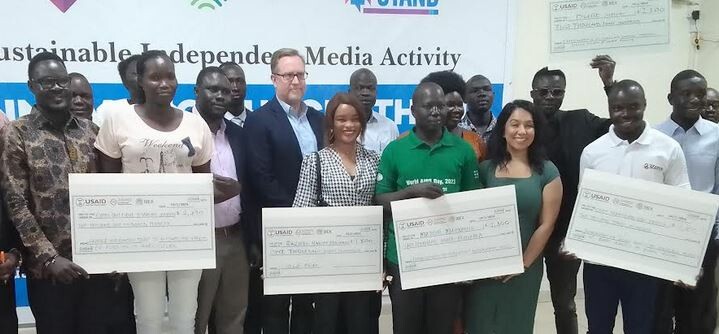The Association for Media Development in South Sudan (AMDISS) on Wednesday awarded five young South Sudanese innovators with mini-grants after they participated in the Innovation Hackathon Round 2.
With support from the United States Agency for International Development (USAID) and The International Research & Exchanges Board (IREX), the Innovation Hackathon Round 2 provided an opportunity for the participants to pitch ideas on how to increase access to information in South Sudan.
Among the winners are Mayom Mabuong who took the first position for his project to establish community information hubs in Rumbek. Chuol Jany and Nyakume Simon, who presented a joint project on creating an information system for farmers to mitigate the effects of flooding on agriculture in Mayendit and Leer counties, emerged second winners.
Rachel Hakim Edward, the founder and owner of GoGo Play, an entertainment App, emerged the third with her project to improve entertainment in South Sudan.
Onen Francis and Irra Patrick took the fourth position for their project which plans to distribute solar radios to increase access to radio service in rural areas in Torit.
Dube Simon was the fifth with a project to empower 20 women and girls through social media storytelling and counter social media platforms’ misuse in South Sudan.
The five winners were awarded prizes based on their project cost, ranging from USD 1,800 to 2,300.
Speaking at the event to announce the winners, Ayaa Irene, the director of AMDISS, urged the winners to address challenges faced by communities through their innovations and ideas.
“As AMDISS, we have been struggling to address some of the challenges in this country but we realize that we have so many challenges that AMDISS alone cannot address them,” she stated. “This is why we have come up with an initiative like this to call you to assist us to address some of the community issues.”
For his part, James Boboya, the IREX representative, stressed the need to see the winners provide sustainable and effective solutions to communities.
“The reason why the Sustainable Independent Media Activity (SIMA) is investing in this support is that we are interested in solutions that we bring to communities and those solutions have to be effective,” he said. “I am happy when most people who spoke pointed out that this is not about them but the community because the problems that you have identified are communities-based issues.”
Mayom Mabuong, one of the winners, said that the information hubs will be of benefit to the local communities through the dissemination of accurate information and carrying out civic education as the country approaches elections.
“When the community is conducting meetings, my volunteers will be there to record the accurate information and disseminate it so that the public, including the diaspora, can benefit,” he explained. “The hubs will also help during the upcoming elections and my volunteers can carry out civic education.”
Meanwhile, Chuol Jany, another winner who worked jointly with Nyakume Simon Maguek, stressed that their project targets to create Farmer Information Teams to mitigate the effects of flooding on agriculture.
“It is important to enlighten the farmers by giving them information that will guide them to have an impact on cultivation,” he said. “This money seems small but it will do a lot in our community” he assured.”
Rachel Hakim, who was the third, said her project will eventually evolve from a website to an application that can allow content creators and entertainers to showcase their talents and earn from it.
The grants will enable the winners to implement their projects.




